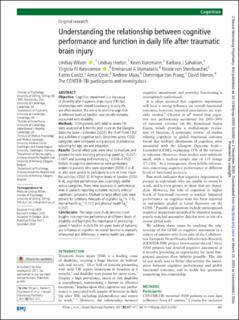Understanding the relationship between cognitive performance and function in daily life after traumatic brain injury
Wilson, Lindsay; Horton, Lindsay; Kunzmann, Kevin; Sahakian, Barbara J.; Newcombe, Virginia; Stamatakis, E; Steinbuechel, Nicole; Cunitz, Kathrin; Covic, Amra; Maas, Andrew; van Praag, Dominigue; Menon, David; Andelic, Nada; Andreassen, Lasse; Anke, Audny; Frisvold, Shirin; Helseth, Eirik; Røe, Cecilie; Røise, Olav; Skandsen, Toril; Vik, Anne; Åkerlund, Cecilia; Amrein, Krisztina; Antoni, Anna; Audibert, Gerard; Azouvi, Philippe; Azzolini, Maria Luisa; Bartels, Ronald; Barzo, Pal; Beauvais, Romuald; Beer, Ronny; Bellander, Bo-Michael; Belli, Antonio; Benali, Habib; Berardino, Maurizio; Beretta, Luigi; Blaabjerg, Morten; Bragge, Peter; Brazinova, Alexandra; Brinck, Vibeke; Brooker, Joanne; Brorsson, Camilla; Buki, Andras; Bullinger, Monika; Cabeleira, Manuel; Caccioppola, Alessio; Calappi, Emiliana; Calvi, Maria Rosa; Cameron, Peter; Lozano, Guillermo Carbayo
Peer reviewed, Journal article
Published version

Åpne
Permanent lenke
https://hdl.handle.net/11250/2735773Utgivelsesdato
2020Metadata
Vis full innførselSamlinger
Sammendrag
Objective: Cognitive impairment is a key cause of disability after traumatic brain injury (TBI) but relationships with overall functioning in daily life are often modest. The aim is to examine cognition at different levels of function and identify domains associated with disability. Methods: 1554 patients with mild-to-severe TBI were assessed at 6 months post injury on the Glasgow Outcome Scale—Extended (GOSE), the Short Form-12v2 and a battery of cognitive tests. Outcomes across GOSE categories were compared using analysis of covariance adjusting for age, sex and education. Results: Overall effect sizes were small to medium, and greatest for tests involving processing speed (ηp2 0.057–0.067) and learning and memory (ηp2 0.048–0.052). Deficits in cognitive performance were particularly evident in patients who were dependent (GOSE 3 or 4) or who were unable to participate in one or more major life activities (GOSE 5). At higher levels of function (GOSE 6–8), cognitive performance was surprisingly similar across categories. There were decreases in performance even in patients reporting complete recovery without significant symptoms. Medium to large effect sizes were present for summary measures of cognition (ηp2 0.111), mental health (ηp2 0.131) and physical health (ηp2 0.252). Conclusions: This large-scale study provides novel insights into cognitive performance at different levels of disability and highlights the importance of processing speed in function in daily life. At upper levels of outcome, any influence of cognition on overall function is markedly attenuated and differences in mental health are salient.